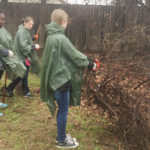Posted: 11/24/03
Baylor nursing students care for neglected Texas community
By George Henson
Staff Writer
ITASCA–A short while ago, people in Itasca often drove more than 30 miles for medical care. Soon medical care will be ringing the doorbells of their homes.
Students from Baylor University's School of Nursing family nurse practitioner program will begin providing care at the clinic recently opened in the heart of Itasca, and they will make regular visits to some people in their homes.
Itasca lies in a triangular-shaped point of Hill County, with Johnson and Ellis counties nearby.
 |
| Clinic director Lisa Taylor, office manager Darla Fender and registered nurse Gracie Faulkner have opened the Baylor clinic in Itasca to help train family practice nurses and give aid to the neglected community. |
Professor Lisa Taylor, who lives in Maypearl, was well aware of the need for a closer health-care provider in the area. The clinic, which opened Oct. 1, is housed in the same building the community's only doctor used before he closed his doors in 1999.
“The people in this area have been just going wherever, or more often than not, they haven't been going anywhere,” Taylor said. A study conducted in preparation for submitting a grant request showed that when residents did seek medical care, they drove an average of 30.1 miles.
Taylor worked almost a year on the project in addition to her teaching duties at the nursing school in Dallas. The grant was awarded in July, but Baylor attorneys investigated the school's liabilities before giving the go-ahead for the Oct. 1 opening.
Currently, the facility is being run by Taylor, registered nurse Gracie Faulkner and office manager Darla Fender. All three women are long-time residents of the area and are thrilled to be meeting their neighbors' needs.
That is reflected in the hours the clinic is open: Monday, 8 a.m. to 5 p.m.; Tuesday, noon to 8 p.m.; Wednesday, 8 a.m. to noon; Thursday, 10 a.m. to 7 p.m.; Friday, 10 a.m. to 8 p.m.; and Saturday, 9 a.m. to 1 p.m.
“The people around here don't need another 8-to-5. They need someone when they get home from work and find out their child is sick and when they wake up on Saturday morning and their child is running a fever,” Taylor said. “It's really crazy for the people who have to work here, but for the people who need us we're there.”
The looks of the staff will soon be changing, however. A permanent medical provider is scheduled to begin work at the clinic Dec. 17, freeing up Taylor to concentrate on her primary task as far as the clinic is concerned. “My job is to make sure all the grant funds are used the way they are supposed to be used,” she said.
Once the spring semester starts, the eight family nurse practioner students set for spring graduation also will begin providing care while receiving additional training. Each student is required to work 450 volunteer hours during the final semester prior to graduation.
“They basically work four days a week for free,” Taylor explained. About a third of their time will be spent at the Itasca site, with the other hours spent at two other Baylor-sponsored clinics.
The clinic has not yet been approved as a Medicaid or Medicare provider, so when people under those programs come in for treatment, “we treat them and basically just eat the cost,” Taylor said.
They clinic also is awaiting clearance to make claims on insurance providers, so at present the clinic collects only the co-pays and writes off the rest.
Both of those hurdles should be cleared soon, however.
Even then, some people have no insurance and are not under any government assistance program. The clinic will employ a sliding scale fee for those patients, based on federal poverty guidelines and the number of people in the home. A typical fee in such cases could be $10 to $15.
Some people cannot afford even that amount, however, so the clinic is working with the local ministerial alliance to fund charity care through exchange of services.
“That way we can tell them: 'We realize you don't have any money, but we are offering you a service, and we want you to do a service for us. We need you to mow Mrs. Jones' yard,'” Taylor explained. “I just don't believe free is the answer, and I think in this community they would prefer a way to pay for what they receive.”
Taylor believes the clinic will be a good fit for training nurses in the family nurse practitioner program.
“Our program is designed for missionary nurses who are going to serve the underserved, many in rural areas just like this one,” she said. “One of the things they will learn is how to be creative to keep costs low enough for the people to get the treatment they need. Most of them have said this is the kind of nursing they want to do, and we are giving them the opportunity to actually do it.”
The clinic also will further Baylor's Vision 2012 goals to be a university that combines academic excellence with Christian ministry, she said. “This is 2012. You're talking stewardship; you're talking service. We can feel free to pray with our patients and at the same time make sure they are getting excellent medical care, whether they are underinsured or uninsured.”














We seek to connect God’s story and God’s people around the world. To learn more about God’s story, click here.
Send comments and feedback to Eric Black, our editor. For comments to be published, please specify “letter to the editor.” Maximum length for publication is 300 words.